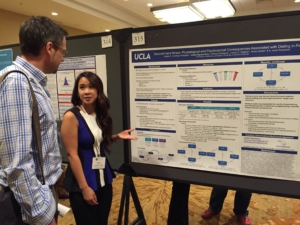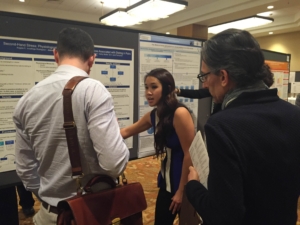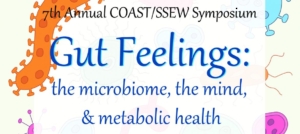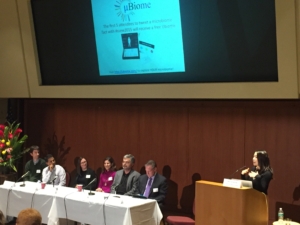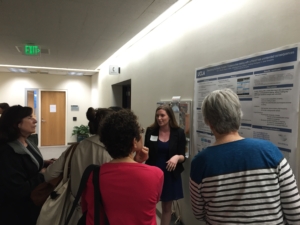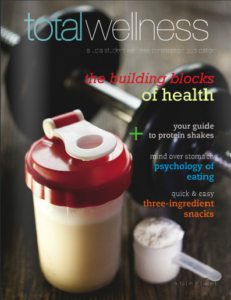This past weekend, the DiSH lab attended the 17th Annual Society for Personality and Social Psychology (SPSP) Convention in San Diego, CA. We’re extremely proud of how well we were represented at this conference – we had undergraduates, lab managers, graduate students, DiSH Collaborators, and of course, Dr. T. all in attendance!
On Thursday, Jan. 28th, we attended the Social Personality Health Network (SPHN) Preconference, where we learned about weight stigma, mobile health tracking, personality traits tied to health behaviors, and big data. DiSH Grad Student Laura Finch also presented a poster at SPHN!
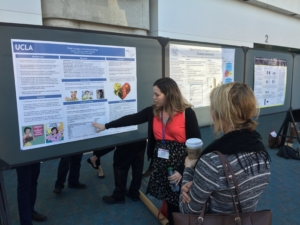
Laura presenting her poster at SPHN!
Check out what some of our undergraduate research assistants and lab manager Jolene had to say:
“Attending SPHN opened my eyes to just how intimate health and social psychologists are getting with their participants to attain the most salient data for their research, and how our very own DiSH lab is following suit. Psychologists from all over the nation explained how they are utilizing participants’ personal mobile devices to collect self-report and physiological data in response to weight stigmatizing events – something that the DiSH lab has already started utilizing in its Texting and Hashtag studies. Yesterday’s conference revealed to me just how much technology is allowing current research to delve into the depths of the human experience at levels that past instrumentation could not dare reach, and it excites me to know that the DiSH lab is contributing to the forefront of what seems to be the most promising findings health and social research have ever uncovered.” – Megan White
“SPHN was a great experience because we had the opportunity to interact with so many individuals who are professionals in the field of Health Psychology. In addition, the experience provided us insight on new upcoming research conducted by graduate students and faculty from various universities across the United States.” – Grace Nguyen
“SPHN is always a great opportunity to hear about the latest studies on social psychology and health, make connections with some of the field’s leading researchers, and support fellow DiSH Labbers. This year, I particularly loved Brenda Major’s talk on weight stigma, and I was fascinated by how gratitude and mindfulness can have such a significant impact on one’s physiology. I also really enjoyed seeing Traci and her students again and was very proud that we were the one of the only labs–if not the only lab–that had our undergraduate RAs attend. Laura’s poster was great too!” – Jolene Nguyen-Cuu
Towards the middle of the afternoon, Dr. T even led all the SPHN attendees in an energizing group-stretch:
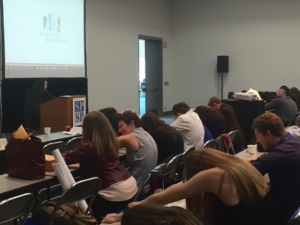
Dr. T. leading an energizing mid-conference stretch!
The following day, Dr. T. chaired a symposium on “Diet and Exercise in a Social World”. At the symposium, DiSH Graduate Student Angela Incollingo Rodriguez and DiSH Collaborator Dr. Andrew Ward both gave great talks, covered in more detail here. DiSH Collaborator Jeff Hunger also gave a talk over the weekend!
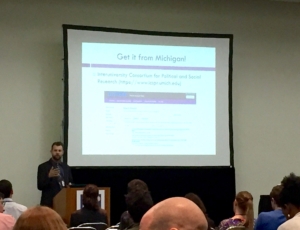
Jeff Hunger giving a talk at SPSP!
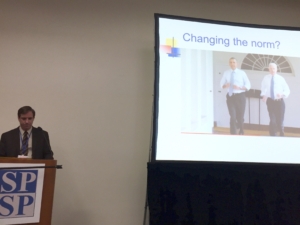
Dr. Andrew Ward giving his SPSP talk!
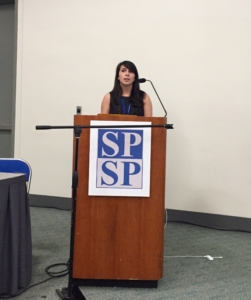
Angela Incollingo Rodriguez giving a talk at SPSP!
At the end of the weekend, the DiSH Lab shared a meal with Dr. Andrew Ward’s students from Swarthmore College. What a nice way to end a weekend of great research and great collaborators!
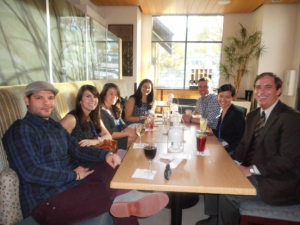
The DiSH Lab & Dr. Andrew Ward and his students from Swarthmore College.

